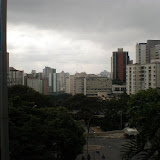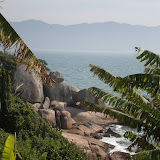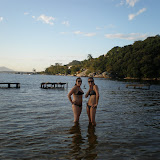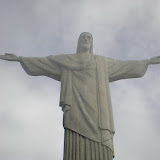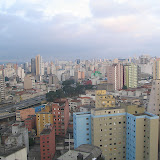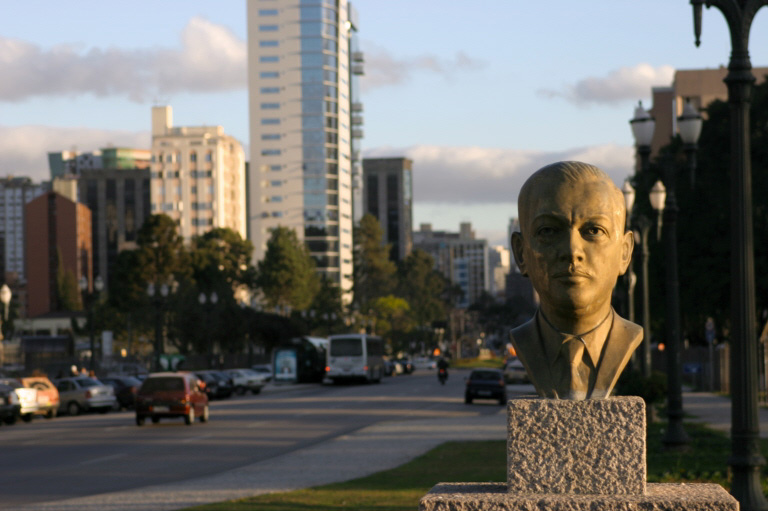I had made a comment based on what I was told in a catholic classroom, how the late Pope JP II had made a donation to a local favela in Rio to prevent favela residents from being evicted from their homes. What I understood, the Pope asked the President of Brasil how much would it cost to bring them peace from the danger of eviction. He was told the price would be high. Then the pope offered his papal ring in request that the people of the Rio favela not be evicted.
Apparently the story has some mixed up facts.
The actual story was published 27 years ago in Time magazine, during JP II's first visit to Brasil.
------------
Monday, Jul. 14, 1980
Just "Look Around a Bit"
By Richard N. Ostling
In a troubled land, the Pope pleads for social justice
Visiting Brazil, a country in which doing something as simple as giving bread to a worker on strike can be a political act, Pope John Paul II last week did his work in the shadow of two Christs: the passive Christ who said, "My kingdom is not of this world," and the active Christ who called upon all mankind to "love thy neighbor as thyself."
In the slums of Rio de Janeiro. John Paul saw squalor. He climbed up a dirt road past the wooden shacks where 20,000 squatters exist under constant threat of eviction, toward a tiny parish church that serves the favela of Vidigal. On the way, he suddenly turned aside into a
three-room hovel, where Elvira Almeida Lima, caught by surprise, had yet to make her bed or clear the breakfast dishes. The Pope gently kissed the old woman and blessed her. As he left she clutched a tablecloth and buried her face in it, sobbing. When he reached the church. John Paul removed the gold ring that Pope Paul VI had given him when he was named a Cardinal. Then he handed it to a local priest as a donation to the parish.
Those were only two emotional events in a twelve-day, 9,000-mile journey with an exhausting itinerary that took the Pope all over Brazil, the world's largest Roman Catholic nation. The papal plane touched down at Brasilia, the futuristic capital of Brazil, where the Pope marked out one of his major themes by offering President Joao Baptista de Oliveira Figueiredo a sermon on social justice. The tour's pitch rose in Belo Horizonte, the
offering President Joao Baptista de Oliveira Figueiredo a sermon on social justice. The tour's pitch rose in Belo Horizonte, the
nation's third largest city. Youths cheered wildly and chanted, "The Pope is our king!" John Paul spoke movingly to them of life under the Nazis, when, he said, "I saw my convictions trampled on."
Bells pealed all across the congested city of Rio as John Paul's "Popemobile" arrived. At a jammed open-air Mass in sight of Sugar Loaf Mountain, the Pope made his way to the altar, hugging and kissing babies. Two days later, in São Paulo, the fervor of an open-air throng of 1.5 million brought tears to John Paul's eyes.
The Pope's warm gestures, the stately progress via Popemobile through city streets, the huge adoring crowds, the songs and symbolic gifts (among other things, a guitar, a coffee plant, a h
ard hat) are now routine in John Paul's travels. In Brazil, the familiar spectacle tended to blur the importance of the trip. The Pope's visit has notable significance for Brazil, where 80% of the 120 million people are at least nominally church members, and some 80,000 groups of believers, known as "base communities," operate mainly without priests. But in the perspective of history, John Paul's achievement in Brazil may be his often compelling attempt to link the church with revolutionary social reform but to draw the line at political violence.
The papal strictures are clear enough.
But the distinction is far from clear between the strong social pressure that the Pope seems to endorse and the overt political action that he has forbidden. In Brazil, that line has become a razor's edge.
Brazilian Catholicism once lived all too cozily with dictators. After the military coup in 1964,

the hierarchy rendered public thanks to God for the soldiers who "delivered us from Communist danger." But for a decade and more. Brazil's bishops have been known for their willingness to stand up to the regime in the name of Christian justice. As one priest says, "The government calls a bishop a Communist, but when we see people being exploited, we have to say this is contrary to the Gospel." The toll has been high —since 1968, by church count, 122 bishops, priests and seminarians and 273 lay pastoral workers imprisoned or detained, and 84 people physically or psychologically abused. Despite the harassment, the progressive National Conference of Brazilian Bishops has become the most severe critic of the government. The church's task now, explains Paulo Evaristo Cardinal Arns of Sao Paulo, is to seek "a more just and participatory society." An indirect church-state clash occurred this spring when Brazil's auto metalworkers began a 41-day strike in Sao Paulo. The government, which is desperately trying to build up Brazil's industrial production, declared the strike illegal and took control of the unions. Bishop Claudio Hummes. Arns' head of the labor pastorate, promptly opened 75 churches for strike meetings and food distribution. Earlier this year, too, by an overwhelming vote (172 to 4, though with four abstentions and 100 absent), the National Conference of Brazilian Bishops took a stand on land reform, Brazil's most serious problem. More than 30 million people have been driven off the land and into the slums since 1964 to make way for industry and agribusiness. The bishops declared the government's economic policies are responsible for the hardship. Though some labeled the action "Marxist inspired," the bishops condemned the use of land for exploitation, urging instead land in the hands of those who work it.
John Paul has made no comments on these specific church actions, but he may lay down general guidelines at a meeting of Brazil's bishops this week. Last week he steadily strengthened the hand of Brazil's progressives, in effect trying to seize the initiative in social action from Marxist revolutionaries. But as in Mexico last year, he issued notes of caution lest Catholics be lured into concluding that ends excuse any means.
Speaking to President Figueiredo and others at a Brasilia reception. John Paul listed "seven rights" that instantly became a declaration for activists: "The right to life, to security, to work, to a home, to health, to education, to religious expression. " In the slums of Rio he called out to the rich: "Look around a bit. Does it not wound your heart? Do you not feel remorse of conscience because of your riches and abundance?" He urged economic reorganization and a "more just distribution" of wealth. In a land where the church once preached passivity and fatalism, he urged the poor to "do everything legal to assure their families whatever is necessary for life." Afterward, listeners handed him letters asking for help in or der to get running water, electricity, sew age lines and title to the land they live on.
On Thursday John Paul stood for nearly two hours in a driving rain to meet workers in a soccer stadium in Sao Pau lo. He seemed to be drawn deeper into politics. As soon as John Paul finished his greetings, a metalworker took the micro phone, and implored him to support workers as they "break the barrier imposed by the political system that governs us." The Pope called out for social justice. But he added a line that again emerged at the heart of his message. Social justice "cannot be attained by violence. Violence kills what it intends to create.''
Reported
by George Russell/Rio de Janeiro and Wilton Wynn/Rio de Janeiro
With reporting by George Russell, Wilton Wynn






 Welcome to the 2008 UF in Curitiba blogspot! The images above are the five universities represented in this year's study abroad class. In this section you will find information pertaining to the six weeks spent in Brazil by the University of Florida in Curitiba study abroad program. It contains schedules, essays and links to pictures and personal blog sites of this year's participants. It will be especially of interest to anyone considering the University of Florida's Urban and Regional Planning studying abroad program in Curitiba, Parana, Brazil (http://www.dcp.ufl.edu/urp ), as well to anyone with a general interest in Brazil. Once admitted to the program, you will be invited to join the Facebook group which contains more detailed information with contacts and anecdotal information which will be useful for your study abroad experience.
Welcome to the 2008 UF in Curitiba blogspot! The images above are the five universities represented in this year's study abroad class. In this section you will find information pertaining to the six weeks spent in Brazil by the University of Florida in Curitiba study abroad program. It contains schedules, essays and links to pictures and personal blog sites of this year's participants. It will be especially of interest to anyone considering the University of Florida's Urban and Regional Planning studying abroad program in Curitiba, Parana, Brazil (http://www.dcp.ufl.edu/urp ), as well to anyone with a general interest in Brazil. Once admitted to the program, you will be invited to join the Facebook group which contains more detailed information with contacts and anecdotal information which will be useful for your study abroad experience. 